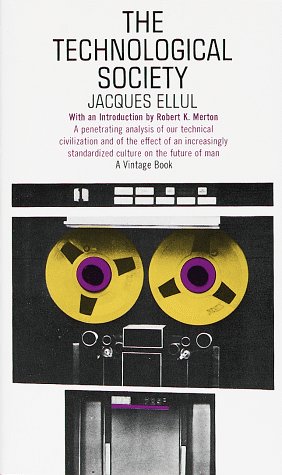buchwurm
The Technological Society (A Vintage book
V-390)
av Jacques Ellul (forfatter).
Random House USA Inc 1973 Mass Market Paperback
buchwurms eksemplar av The Technological Society (A Vintage book - V-390)
Lesetilstand
Har lest denneHylle
Ingen hylle
Lesedato
Ingen lesedato
Favoritt
Ingen favoritt
Terningkast
Ingen terningkast
Min omtale
Ingen omtale
Bokdetaljer
Forlag Random House USA Inc
Utgivelsesår 1973
Format Mass Market Paperback
ISBN13 9780394703909
Språk Engelsk
Sider 449
Finn boka på biblioteket
Finner du ikke ditt favorittbibliotek på lista? Send oss e-post til admin@bokelskere.no med navn på biblioteket og fylket det ligger i. Kanskje vi kan legge det til!
Bokelskeres terningkastfordeling
0 2 0 0 0 0Diskusjoner om boka
Ingen diskusjoner ennå.
Start en diskusjon om verket Se alle diskusjoner om verketSitater fra dette verket
Freedom is not static but dynamic; not a vested interest, but a price continually to be won. The moment man stops and resigns himself, he becomes subject to determinism. He is most enslaved when he thinks he is comfortably settled in freedom. In the modern world, the most dangerous form of determinism is the technological phenomenon. It is not a question of getting rid of it, but, by an act of freedom, of transcending it. How is this to be done? I do not know. That is why this book is an appeal to the individual´s sense of responsibility. The first step in the quest, the first act of freedom, is to become aware of the necessity. The very fact that man can see, measure, and analyze the determinisms that press on him means that he can face them and, by so doing, act as a free man. If man were to say; "These are not necessities; I am free because of technique, or despite technique," this would prove that he is totally determined. However, by grasping the real nature of the technological phenomenon, and the extent to which it is robbing him of freedom, he confronts the blind mechanisms as a conscious being.
Our modern worship of technique derives from man's ancesteral worship of the mysterious and marvelous character of his own handywork.
Let no one say that man is the agent of technical progress [...] and that it is he who chooses among possible techniques. In reality, he neither is, nor does anything of the sort. He is a device for recording effects and results obtained by various techniques. He does not make a choice of complex and, in some way, human motives. He can decide only in favor of the technique that gives the maximum efficiency. But this is not choice. A machine could effect the same operation. Man still appears to be choosing when he abondons a given method that has proved excellent from some point of view. But his action comes solely from the fact that he has thoroughly analyzed the results and determined that from another point of view the method in question is less efficient.
Legg inn et nytt sitat Se alle sitater fra verket







